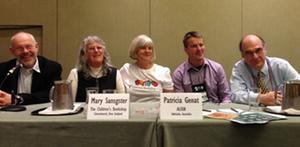
"The energy and enthusiasm just fires me up," added Neale, noting with a smile that booksellers in the U.K. tend to be "just a little bit more gloomy" than their American counterparts.
 |
|
|
From left: panelists Mats Alstrom, Mary Sangster, Patricia Genat, Patrick Neale; moderator Oren Teicher. |
|
Recently U.K. indies have been reporting much more promising figures than in the past five years, attributable in some part to the countrywide Books Are My Bag campaign. The campaign, which culminated on September 14 with bookshops around the U.K. hosting parties, received £80,000 in financial support from U.K. publishers. More than 300,000 Books Are My Bag tote bags were given away, and Neale even managed to get Prime Minister David Cameron to pose for a picture with a tote bag in front of his store. (Cameron is a regular customer.) Neale also pointed to setting up bookstores and cafes at music and food festivals as a surprisingly lucrative, growing trend.
"You've got to go where the customers go," said Neale, whose own store is now involved with five different festivals.
Patricia Genat, the president of the Australian Booksellers Association, reported that Australian booksellers have begun to "pull ourselves out of it." In a recent survey of 200 Australian bookshops, 69% of responders said that Christmas trading was much better in 2013 than the previous year. Since 2011, the austral ABA has spearheaded National Bookshop Day; the fourth such celebration will come later this year. It grew out of the "doom and gloom" that settled on the book market in 2009, she said.
Genat emphasized the importance of reaching out to the "unliterary community," along with the literary community, when organizing promotions such as National Bookshop Day. The ABA wants to make sure that "everybody could come into a bookstore and feel comfortable about the process." People who do not read regularly, she insisted, "should read and could read, if we only invited them into the store."
Although the New Zealand book market is "not doing so well overall," there were encouraging reports from some bookshops around the country, said Mary Sangster, owner of the Children's Bookshop in Christchurch, and president of Booksellers New Zealand. The feeling among booksellers was positive, she related. They felt they were "heading to the right place," and Sangster suggested that New Zealand indies are "where you guys were about a year ago."
Mats Alstrom, owner of Djursholms Bookshop, Stockholm, Sweden, and board member of the Swedish Booksellers Association, offered insights into the Swedish book market. There are some 350 bookstores for a language area of about 10 million people, Alstrom said, and one large chain holds about 70% of the bricks-and-mortar market; essentially, Sweden has about 100 indie bookstores. Shortly after joining the European Union, Sweden saw a boom in bookselling due to lowered taxes. In the five or six years since, Alstrom said, Swedish booksellers have lost 20%-30% of that business. To combat that, and a decline in reading among children and teens, the SBA is organizing a celebration called World Book Week to coincide with World Book Night on April 23.
When asked what strikes them as the biggest differences between booksellers in their countries and American booksellers, the panelists gave a variety of answers.
Sangster was impressed, she said, by both the amounts of events that American booksellers run and the emphasis placed on them: "We had one author visit last year," she said. "Because we're at the end of the earth apparently, publishers say it's too expensive to send authors. You folk are really fortunate with the number of authors you can build events around."
Alstrom agreed, suggesting that Sweden is at the other end of the earth and as a result similarly starved for authors. An attendee of four Winter Institutes, Alstrom said that the "first thing" he learned was the importance of events. He added that though he does not discount books generally, children's books are always at a discount at his store. The policy resulted in a sixfold increase in children's book sales.
"I've spent an awful lot of money on books since I've been here," said Neale, which he attributed to "the curatorship on display" in many U.S. indies. "I want to get back and do that. I need to get these great books back in my shop.
"I just wanted to say that I've got massive reassurance from being here," Neale added, as the panel wrapped up. --Alex Mutter

